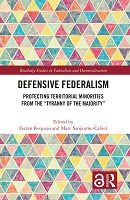Defensive Federalism
Proposal review
Protecting Territorial Minorities from the “Tyranny of the Majority”

Contributor(s)
Requejo, Ferran (editor)
Sanjaume-Calvet, Marc (editor)
Language
EnglishAbstract
Defensive Federalism presents an original contribution to the field of federalism and multinational democracies, exploring the concept of defensive federalism as a protection of self-government against the “tyranny of the majority”. The empirical evidence on federal and regional polities often shows critical imbalances in the territorial division of powers beyond what has been formally established in the constitutional rules. This volume highlights the rights, institutions, decision-making processes, and procedural rules that can protect and develop the practical political, economic, and cultural powers of federated and regional entities, especially those linked to territorial national minorities. The authors focus on federalism as a safeguard of self-rule, as well as a set of institutional and procedural rules to avoid the territorial dimension of the “tyranny of the majority”. They answer two fundamental questions: How is it possible to design new stable and fairer federal agreements between national minorities and majorities where there is no single ideal solution? Is there a need for a new kind of “defensive federal model” for approaching national pluralism in liberal democracies? This book will be of great interest to students and scholars of federalism, national diversity, and democracy, as well as policymakers and practitioners in both public and private institutions.
Keywords
Consociational, Constitutional, Decision-Making, Defensive, Democracy, Diversity, Federal, Federalism, Government, Institution, Nation, National, Pluralism, Political Asymmetries, Power-Sharing, Procedure, Region, Self-Govern, Self-Rule, Territorial Minorities, Tyranny of the MajorityDOI
10.4324/9781003296065ISBN
9781032281964, 9781032282770, 9781003296065Publisher
Taylor & FrancisPublisher website
https://taylorandfrancis.com/Publication date and place
2023Imprint
RoutledgeClassification
Politics and government
